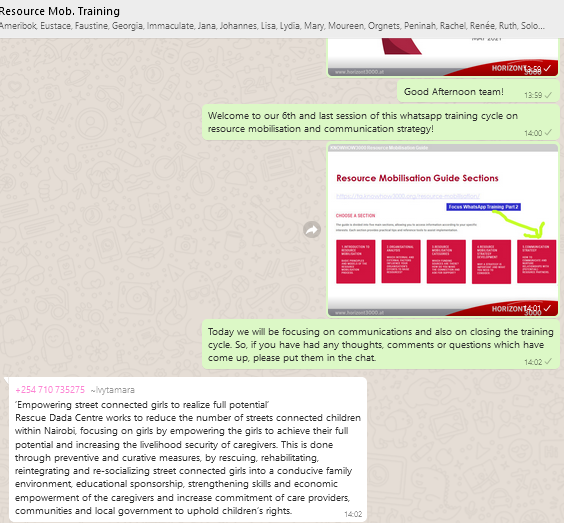Make Your Experiences Count. They Can Change the World.
LET’S BRING ALL OF OUR KNOWLEDGE AND EXPERIENCES TOGETHER.
TOGETHER WE KNOW MORE. TOGETHER WE ACHIEVE MORE. TOGETHER WE DO BETTER.
LET’S BRING ALL OF OUR KNOWLEDGE AND EXPERIENCES TOGETHER.
TOGETHER WE KNOW MORE. TOGETHER WE ACHIEVE MORE. TOGETHER WE DO BETTER.
Published: November 29, 2021
Financial stability and income diversification are high-priority topics for our partner organisations worldwide. The East Africa region has taken up the demand for this topic, developed a resource mobilisation guide and facilitated an innovative training series under the KNOW-HOW3000 programme.
For the development of the guide three Technical Advisors for Resource Mobilisation, Agnes Koechl, Lisa Nixdorf und Beate Farukuoye, put their heads together to come up with content most relevant for partners to promote their financial sustainability and to support diversification of funding sources and resource mobilisation techniques. It was concluded that information and tools, which lay the foundation for informed decision making and strategic planning, will be decisive factors to influence organisations’ resource mobilisation positively. Following these considerations, the authors put together the resource mobilisation guide covering an introduction to resource mobilisation, organisational analysis and resource mobilisation categories.
With editorial support from Annika Witte the guide was made ready for printing and is now available in hardcopy and on the KNOW-HOW3000 platform: https://ta.knowhow3000.org/resource-mobilisation/.
KNOW-HOW3000 launched the resource mobilisation guide in July 2021, followed by a training series to acquaint HORIZONT3000’s East African partner organisations better with the content of the guide and the included toolbox. Considering physical meeting restrictions due to COVID-19 as well as the objective to offer an easily accessible training even when internet is unstable and during busy work schedules, WhatsApp was chosen as a means of training delivery. Additionally, WhatsApp is widely used and can be found on almost every phone. Therefore, users are very familiar with the different features, such as group membership, sending photos and recording voice messages, etc., which makes active training participation easy. You can find the documentation of the training here.
Each of the two WhatsApp training parts was conducted over a period of three weeks with two 2-hour live sessions per week. The sessions consisted of technical input in the form of slides, videos or voice messages as well as group discussions and group work. The participants exchanged their resource mobilisation experiences and perspectives and shared practices from their work.
To facilitate further learning and real-life application of the training content, a practical assignment that was based on the tools discussed concluded each session. The exercises facilitated discussions and decision making on resource mobilisation in the organisations. The second weekly sessions offered room for discussion of completed assignments, questions and distribution of additional material. Apart from the two 2-hour meetings per week, participants had to invest 3-4 hours in reading and assignment preparation time.

57 participants (32 female, 25 male) registered for the training, about 15 of them attended all live sessions and contributed consistently to the discussions. When participants were not able to attend a session, they could follow the content by going through the WhatsApp group at their own pace. Evaluation at the end of the trainings show that the training content was very relevant for the participants and while the methodology was new, it turned out to be overall effective, having the big advantage that the content is readily accessible even when live sessions cannot be joined.
Resource Mobilisation and sustainability are highly important topics for organisations around the world and the KNOW-HOW3000 efforts have come very timely to support organisations developing their resource base.